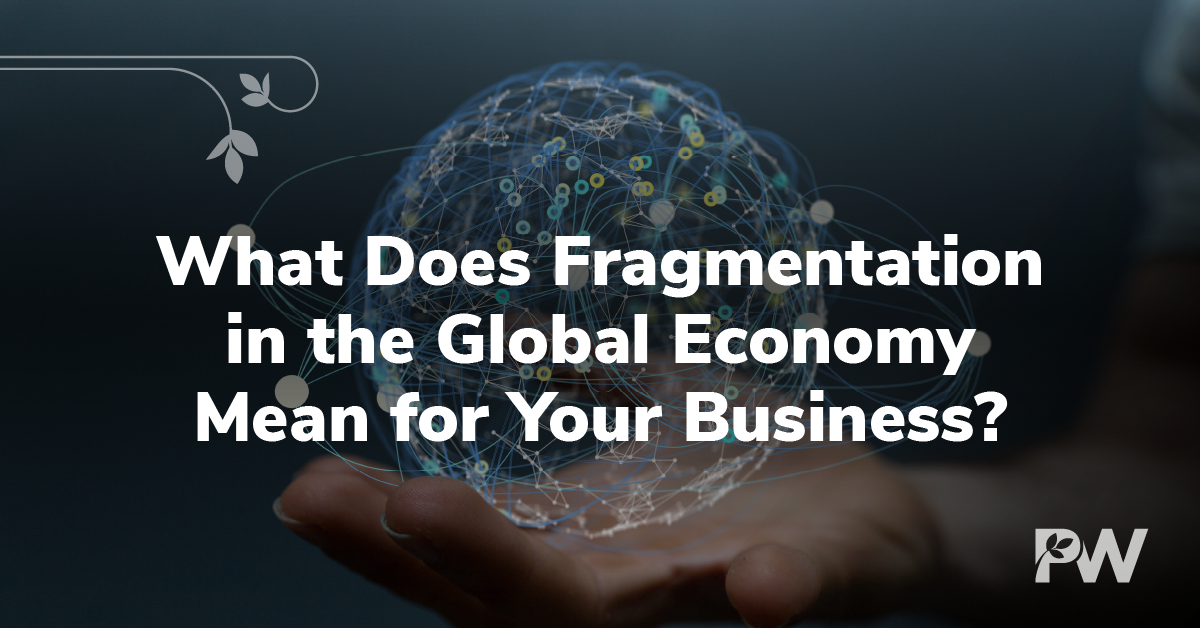Fragmentation in the global economy has had an increasingly large impact on businesses of all sizes. The International Monetary Fund (IMF) estimates “severe fragmentation of the global economy after decades of increasing economic integration could reduce global economic output by up to 7%, but the losses could reach 8-12% in some countries, if technology is also decoupled.” With more countries and cultures entering into the global market, organizations are now having to adjust their strategies and operations to account for this trend. In this blog post, we will discuss what fragmentation in the global economy means for your business and how you can make sure you stay competitive in this ever-changing landscape.
Definition & Causes
Fragmentation occurs when regional or local economies begin to operate independently from each other in terms of fiscal policies and market regulations which lead to greater autonomy for each country/region pursuing their own growth paths. These phenomena are often a result of increased capital mobility over long distances as well as technological advancements which allow different parts of the world to cooperate on an international level while still remaining somewhat independent from external influences. But it can also come with risks. According to Kristalina Georgieva, the managing director of the IMF, “Fragmentation in the world economy means we might see shifts in supply chains that impact on the cost structures on a more permanent basis.” Here is a look at the benefits and challenges that fragmentation can bring.
The Benefits of Fragmentation
For individuals and businesses, increased fragmentation can mean more opportunities for them to both invest in foreign markets or access new resources and services not previously available before. This could be anything from new technologies making production easier and cheaper up until better access to customers from different parts of the world leading up to higher profits due to larger customer bases with improved customer service standards possibly translating into higher sales conversions!
On top of this, fragmentation allows communities within particular countries/regions take control of their economic future while also creating respectful international relationships amongst other nations by engaging in free trade – something which benefits all involved in terms of finding mutual gains through increased cooperation rather than isolationism.
The Challenges of Fragmentation
However, with these benefits come a whole host of challenges that need to be addressed if one wants their business to remain competitive in such a dynamic environment. These challenges range from making sure products/services comply with customs regulations from certain countries up until developing marketing campaigns tailored towards cultural nuances within certain markets so that messages are portrayed correctly at other ends of the world where your company is trying to operate (or re-enter). Cultural fluency is key here since it helps organizations build meaningful relationships with local communities while also gaining trust amongst potential customers – something which is extremely important when competing against domestic brands who may already have an upper hand due to being part of said community themselves!
How Pierce Washington Can Help With Global Fragmentation
Global fragmentation is a major challenge faced by many organizations today as they attempt to meet the demands of their customers while also managing the complexities of different marketplaces. However, thanks to Pierce Washington this doesn’t need to be an issue any longer.
Expertise & Knowledge
Pierce Washington has an experienced team of professionals who have extensive knowledge and experience in the area of global fragmentation. They understand the complexities and challenges faced by businesses looking to expand into new markets and offer tailored solutions that help them address any potential hurdles before implementation takes place.
Total Commerce & Automation Benefits
Pierce Washington helps companies take a Total Commerce approach using automated technologies to streamline operations without compromising on quality or speed. Total Commerce is about meeting the unique needs of your business by intelligently combining direct-, partner-, and self-service channels. This allows the company to provide customizations if needed based on each organization’s specific goals and requirements – something which would otherwise take hours or even days for manual processes! Additionally, automated platforms also enable companies to access data from various marketplaces quickly which reduces response times drastically and leads to increased sales conversions over time!
This omnichannel experience is becoming increasingly more important during times of fragmentation, as it enables companies to present information to their customers so those customers can manage their own account relationship—freeing up sales reps and customer service reps to focus on more strategic activities.
Not only do customers want a more omnichannel experience, they expect it—McKinsey’s recent B2B Pulse survey showed that given the choice of in-person, remote, and e-commerce channels, purchasers want them all. Total Commerce includes support for new selling models and new self-service offerings. By understanding which of your products and services a customer already owns, companies can filter offers based on that information. The power of Total Commerce is that your customer can purchase products and services and modify existing subscriptions and services via self-service. To learn more about Total Commerce, its benefits, and the implications for your business, see this whitepaper from Pierce Washington.
Conclusion
Fragmentation has changed the way businesses operate worldwide and it’s only going to become increasingly prevalent over time as globalization becomes more mainstream. As such, it’s important for companies both large and small alike to get on board by understanding why fragmentation is beneficial as well as preparing for any potential challenges that may arise from operating within such a diverse environment. Pierce Washington’s expertise, knowledge, and automated solutions help businesses enjoy improved efficiency while also cutting costs due to streamlined processes – ultimately making them more competitive in increasingly crowded markets! Doing this allows business to not only remain competitive but also capitalize on potential opportunities present within different parts of the world leading up to increased sales conversions due to better customer understanding through improved customer service standards – something which will no doubt pay off both now and further down the line.
